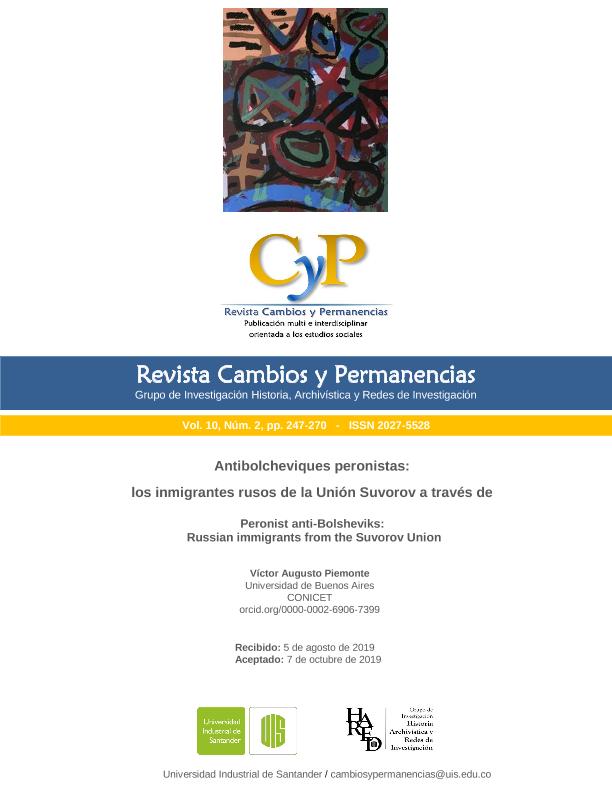Artículo
Aunque la inmigración rusa en la Argentina fue muy importante en términos numéricos durante la primera mitad del siglo XX, continúa siendo muy poco lo que se sabe sobre ella. Creada en 1948 en Buenos Aires por un grupo de rusos blancos que habían integrado el ejército soviético durante la Segunda Guerra Mundial, la Unión Suvorov se propuso como objetivo nuclear a los rusos anticomunistas en todas sus vertientes que habían emigrado a la Argentina. Los suvorovistas se enmarcaron dentro de la tradición occidentalista que mantuvo un largo y encendido debate con la corriente eslavófila. La Unión Suvorov forjó su órgano oficial, el periódico Suvorovets, desde donde canalizó su proyecto militar nacionalista dirigido a luchar contra el comunismo internacional. Nuestra hipótesis es que, pese a su declarada prescindencia política, Suvorovets buscó trascender el terreno militar, adoptando una posición de permanente denuncia del estado soviético. El encendido anticomunismo que pregonó acabó pronto siendo el centro en torno al cual dinamizó su acción la Unión Suvorov. La aplicación de la intensa política estatal anticomunista bajo el gobierno de Perón capturó la atención de sus integrantes, quienes desde el comienzo de su fundación encontraron en el presidente argentino al aliado más confiable. Although Russian immigration in Argentina was very important in numerical terms during the first half of the 20th century, what is known about it remains very little. Created in 1948 in Buenos Aires by a group of white Russians who had integrated the Soviet army during World War II, the Suvorov Union set itself to gather anti-Communist Russians (in every aspect) who had emigrated to Argentina. The Suvorovists were framed within the Westernist tradition that held a long and fiery debate with the Slavophile current. The Suvorov Union forged its official body, the Suvorovets newspaper, from which it channeled its nationalist military project aimed at fighting international communism. Our hypothesis is that, despite its overt political disregard, Suvorovets sought to transcend the military terrain, adopting a position of permanent denunciation of the Soviet State. The ignited anti-communism it proclaimed soon became the center around which the Suvorov Union revitalized its action. The application of the intense anti-communist state policy under Perón’s government captured the attention of its members who, from the beginning of its foundation, found the most reliable ally in the Argentine president.
Antibolcheviques peronistas: los inmigrantes rusos de la Unión Suvorov a través de su prensa
Título:
Peronist anti-Bolsheviks: Russian immigrants from the Suvorov Union
Fecha de publicación:
12/2019
Editorial:
Universidad Industrial de Santander
Revista:
Revista Cambios y Permanencias
e-ISSN:
2027-5528
Idioma:
Español
Tipo de recurso:
Artículo publicado
Clasificación temática:
Resumen
Palabras clave:
INMIGRACIÓN RUSA
,
PERONISMO
,
ANTICOMUNISMO
,
UNIÓN SUVOROV
Archivos asociados
Licencia
Identificadores
Colecciones
Articulos (LICH)
Articulos de LABORATORIO DE INVESTIGACION EN CIENCIAS HUMANAS
Articulos de LABORATORIO DE INVESTIGACION EN CIENCIAS HUMANAS
Citación
Piemonte, Víctor Augusto; Antibolcheviques peronistas: los inmigrantes rusos de la Unión Suvorov a través de su prensa; Universidad Industrial de Santander; Revista Cambios y Permanencias; 10; 2; 12-2019; 247-270
Compartir




